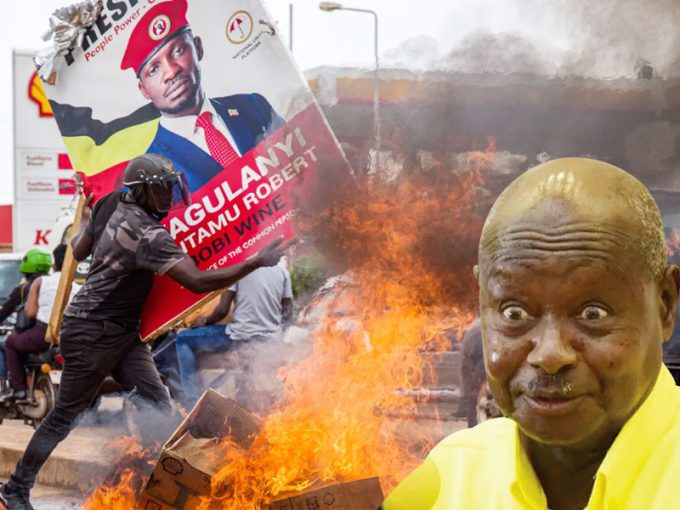President Yoweri Museveni issued a firm warning to the organizers of city riots, urging them to abandon their plans or face the full force of law enforcement. In a national address, he emphasized that staging demonstrations in the heart of Kampala during busy weekdays would not be tolerated.
Museveni criticized such groups as unjust, likening them to individuals who allow their animals to damage others’ gardens. He pointed to recent unrest in neighboring Kenya as an example, emphasizing that Uganda would not permit similar disruptions.

“We cannot tolerate the culture where people damage property seen elsewhere in the world,” Museveni asserted, addressing plans for a ‘Stop Corruption March to Parliament’ scheduled for July 23, 2024. He expressed dismay that organizers did not appreciate the efforts of hard-working Ugandans who ensure food and goods are available on the market.
“Food prices are stable due to Ugandans’ hard work. So, why disrupt us with chaotic behavior?” Museveni questioned, warning that such actions risked instability. He discouraged demonstrations in Kampala during weekdays, noting that they interfere with commerce and individuals’ livelihoods.
Instead, the president suggested demonstrators choose weekends when city traffic is lighter, enabling gatherings in places like Kololo to voice their concerns openly. He emphasized respecting others’ work and livelihoods, urging protesters to avoid disrupting daily life in the city.
Museveni concluded by reaffirming Uganda’s commitment to maintaining peace and order, urging all citizens to prioritize stability and economic progress.
The upcoming ‘Stop Corruption March to Parliament’ scheduled for July 23, 2024, represents a significant moment in Uganda’s socio-political landscape. This planned demonstration is poised to be more than just a gathering of dissatisfied citizens; it symbolizes a collective outcry against perceived systemic issues, primarily centered around corruption within governmental institutions.
At its core, this march is a manifestation of public discontentment and frustration with what many perceive as unchecked corruption that undermines Uganda’s development and prosperity. Corruption has long been a contentious issue in Uganda, impacting various sectors including healthcare, education, infrastructure development, and public service delivery. The allegations of corruption have not only eroded public trust in government but have also hindered efforts to achieve sustainable socio-economic development and equitable distribution of resources.
The organizers of the march, likely a coalition of civil society organizations, activists, and concerned citizens, have chosen Parliament as the focal point of their protest. Parliament, as the legislative body responsible for enacting laws and overseeing government operations, symbolizes both the locus of power and accountability. By directing their protest towards Parliament, demonstrators aim to send a clear message to lawmakers and government officials that corruption cannot be tolerated and that citizens demand transparency, accountability, and ethical governance.
The timing of the march is significant. Scheduled on a weekday, it underscores the organizers’ intent to disrupt normal governmental operations and draw maximum attention to their cause. Weekdays are typically busy in Kampala, Uganda’s capital, with heightened economic activity and traffic congestion. By choosing this day, organizers hope to amplify their message and garner widespread public and media attention, both domestically and potentially internationally.
Moreover, the location of the protest in Kampala, particularly near Parliament, holds symbolic importance. It serves as a strategic site where the voices of ordinary Ugandans can directly confront those in power. The proximity to government offices and institutions not only facilitates visibility but also underscores the grassroots nature of the movement and the diverse cross-section of society it represents.
The march is expected to attract a diverse array of participants, ranging from students and youth activists to civil society leaders, academics, and ordinary citizens disillusioned with the status quo. This diversity highlights the broad-based support for anti-corruption efforts and underscores the unity among Ugandans in demanding change and accountability.
However, the planned march is not without its challenges and controversies. The Ugandan government, under President Yoweri Museveni’s administration, has historically adopted a stringent stance towards public protests and demonstrations perceived as destabilizing or threatening to public order. In the past, such events have been met with heavy-handed responses from law enforcement agencies, including arrests, dispersal tactics, and in some cases, allegations of excessive use of force.
Given this context, there is a palpable sense of anticipation and apprehension surrounding the upcoming march. While organizers have emphasized peaceful protest and adherence to the rule of law, concerns remain about potential clashes with security forces and the government’s response to dissenting voices. The outcome of the march will likely hinge on how authorities and organizers navigate these tensions and uphold democratic principles of freedom of expression and assembly.
In conclusion, the ‘Stop Corruption March to Parliament’ in Uganda represents a pivotal moment in the country’s democratic journey. It symbolizes the resilience and determination of Ugandans to hold their leaders accountable and demand transparency and ethical governance. The success of the march will not only be measured by its turnout and visibility but also by its impact on shaping public discourse, influencing policy decisions, and fostering a culture of accountability in Uganda’s political landscape.
![]()




